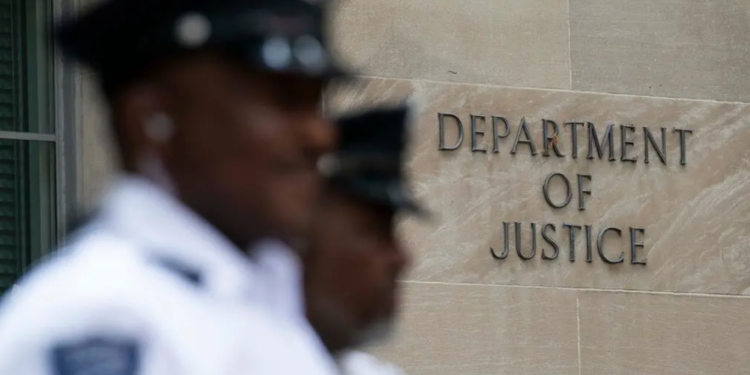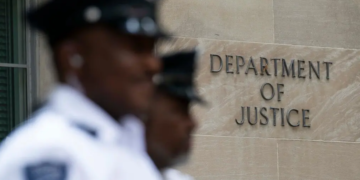May 5, 2025 Story by: Publisher
This article has been updated to include a press release and a statement from the DOJ’s Office of Public Affairs and Attorney General Pam Bondi.
The U.S. Department of Justice has launched a civil rights inquiry into Hennepin County’s new plea-bargaining policy, which instructs prosecutors to consider a defendant’s race.
In an April 2025 letter to Hennepin County Attorney Mary Moriarty, Assistant Attorney General Harmeet Dhillon (Civil Rights Division) said the DOJ would review whether the policy and related practices “may involve the illegal consideration of race in prosecutorial decision-making”.
“As a longtime prosecutor, I firmly believe in the paramount importance of a colorblind criminal justice system,” Pam Bondi, U.S. Attorney General said in a press release on Monday. “This Department of Justice will avail itself of every tool at its disposal to protect all Americans from illegal DEI discrimination.”
Assistant Attorney General Harmeet Dhillon posted a letter on X Saturday informing the Hennepin County Attorney’s Office that the department had launched a “racial discrimination pattern and practice investigation” into the policy change.
“Lady Justice is blindfolded for a reason. Under the leadership of @AGPamBondi and her team, @TheJusticeDept lawyers will investigate and take action wherever necessary to identify government practices that may run afoul of our civil rights norms,”Dhillon posted Sunday evening.
The memo specifically cites Moriarty’s “Negotiations Policy for Cases Involving Adult Defendants,” noting that it directs prosecutors to factor defendants’ racial identities into plea offers. According to the notice, DOJ’s Special Litigation Section will oversee a “comprehensive review” of the office’s practices and will arrange meetings with the county attorney’s office.
The contested policy was adopted by the Hennepin County Attorney’s Office in late April 2025. It states that prosecutors should evaluate defendants as “whole persons, including their racial identity and age,” when negotiating plea resolutions.
Importantly, the policy clarifies that race (and age) “are not appropriate grounds for departures” from the standard sentencing guidelines, meaning these factors alone cannot justify more lenient sentences. Rather, the directive explains, prosecutors should incorporate awareness of racial and age-related disparities into their decision-making.
County Attorney Moriarty has characterized the policy as a tool to address unconscious bias; local reports quote her saying it is meant to make prosecutors “cognizant of racial disparities and unconscious biases” in plea negotiations. The Hennepin County Attorney’s Office has stated it will cooperate with the DOJ review and maintains that the policy complies with the law.
Historical and Statistical Context
Minnesota’s criminal justice system has long exhibited pronounced racial disparities. State data indicate that Black Minnesotans are far overrepresented in the prison population. As of January 2023, Black individuals constituted 36.8% of Minnesota’s prison inmates, despite being roughly 7% of the overall state population.
By comparison, White inmates made up 51.0% of the prison population. Hennepin County – which includes Minneapolis – accounts for the largest share of those commitments (about 25.6% of the state total). Per-capita rates make the gap even clearer: for example, analysis of recent data shows Minnesota’s imprisonment rate for Black residents (about 763 per 100,000 people in 2021) is roughly nine times the rate for white residents (84 per 100,000), with American Indian residents facing an even higher rate (1,630 per 100,000).
Official reports underscore that these gaps are not explained by criminal activity rates alone. A 2020 Minnesota legislative fact sheet noted that people of color in the state are more likely than whites to be arrested, denied bail, incarcerated, or have their probation revoked.
The report found that Black and Native American Minnesotans face especially steep disparities. For instance, self-reported drug use was comparable between Black and white Minnesotans, but in 2011 Black residents were 6.4 times more likely to be arrested for simple marijuana possession than whites.
These patterns mirror national studies: the U.S. Sentencing Commission reported in 2023 that federal Black male defendants received sentences 13.4% longer than comparable white defendants and were significantly less likely to receive probation.
Local Efforts and Practices
The Hennepin County Attorney’s Office has acknowledged and attempted to address local disparities. An internal 2019 “disparity reduction” report found that 51% of its misdemeanor marijuana prosecutions involved Black defendants, even though Black residents made up a smaller share of drug arrests.
In response, the office changed its policy on low-level marijuana cases – largely declining to pursue most minor possession charges – in hopes of reducing this gap. Other Hennepin evaluations have similarly examined racial patterns in charging and case outcomes, seeking data-driven reforms. However, the new policy marks a more explicit, race-conscious approach, which has drawn scrutiny under federal civil rights laws that bar race-based discrimination in criminal punishment.
Moving forward, DOJ’s Civil Rights Division will determine whether the Hennepin policy (and any related practices) complies with federal law, including equal protection guarantees.
The department’s April letter indicates its intent to meet with county officials as part of the investigation. The outcome of the review will hinge on whether considering race as a factor violates constitutional or statutory protections against racial discrimination in the justice system.
Sources: CBS News / Legislative and judicial reports on racial disparities/ DOJ Office of Public Affairs

















